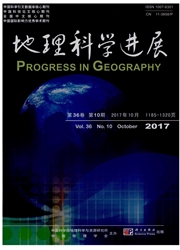

 中文摘要:
中文摘要:
京津冀城市群是中国在国际经济体系中具有最强竞争力的支撑平台之一,也是中国乃至全世界水安全保障难度最大的地区之一。本文主要以2000-2014年数据为基础,采用泰尔系数、变异系数、曲线分析和空间分级分类分析等方法,揭示了京津冀城市群水资源与用水变化的时空特征。结果显示:1绝大多数城市多年平均水资源总量显著减少,干旱化的长期趋势明显,而且北部、西部城市减少幅度更大;2京津冀城市群水资源极度短缺,空间不均衡性呈现先减小后增大的趋势,而且中部和南部城市水资源开发利用潜力更低,缺水更甚;3绝大多数城市用水总量零增长或缓慢负增长,用水结构以工农业用水比重下降为主要特征,各类用水的空间不均衡性保持相对稳定;4用水效率普遍快速提升,空间分布差异呈现先增大后减小的总体趋势。基于此,建议京津冀城市群实施"以水量城"的城镇化政策和"以水定产"的产业政策,完善水生态补偿政策,落实水资源管理红线政策,实现水资源约束下各城市间经济社会与生态环境的协同发展。
 英文摘要:
英文摘要:
The Beijing-Tianjin-Hebei Urban Agglomeration is one of the most competitive support platforms of China in the international economic system.It is also one of the most challenging areas with regard to water security in China and worldwide.Mainly based on data from 2000-2014,we analyzed the spatiotemporal characteristics of water resources exploitation in the Beijing-Tianjin-Hebei Urban Agglomeration using quantitative and qualitative methods,including Theil index,coefficient of variation,curve analysis,and spatial classification analysis.The results show that:(1) The average annual water resources of nearly all cities decreased evidently.The decrease in the north and west were greater than that in the south and east.(2) Water resources are scarce and unevenly distributed in the Beijing-Tianjin-Hebei Urban Agglomeration.The spatial imbalances of water resources first decreased and then increased during the study period.Water scarcities in the central and southern parts of the region were more serious than that in the north.(3) Total water utilizations of nearly all cities showed zero or slow negative growth.The proportion of industrial and agricultural water uses in total water utilization decreased in most cities.However,the spatial imbalances of all types of water use remain relatively stable.(4) Water use efficiencies in all cities increased rapidly.Their spatial differences first increased and then decreased.Based on the above spatiotemporal characteristics,it is recommended that the size of cities and the scale of industrial operations in the Beijing-Tianjin-Hebei Urban Agglomeration should be planned according to water resources carrying capacity,and corresponding urbanization and industrial development policies should be implemented.Water and ecological compensation policies should be improved.Water resource management red line policies should be carried out.
 同期刊论文项目
同期刊论文项目
 同项目期刊论文
同项目期刊论文
 期刊信息
期刊信息
